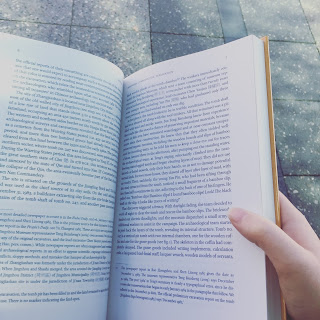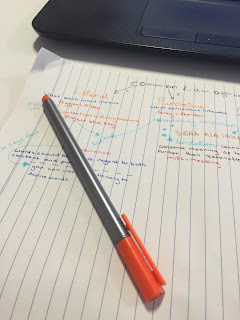Exam 101 Preparing for the exam
Exams really aren’t that hard –
once you’ve got a fairly good idea for how to anticipate the exam question you
can essentially hone your preparations to ensure that you’re set for studying
(to learn how to anticipate the exam question refer to the archive blogs for August
2017).
There are several routes that this
can take. I personally recommend that you begin studying 6 weeks out from the
exam. I will label what to do for each week and you can step in wherever you
fit in. (For example, if you only have four weeks left begin from week four not
week six.)
You will reap the most benefit if
you do the program from start to finish, but it is the final weeks of
consolidated learning that you must focus on if you have limited time.
Week Six
Daily Activities
·
Check for the examinable areas of the course
·
Summarize the biggest topics into four pages
each
·
Summarize critical topic components into cue
cards
·
Scan forward for the next six weeks and devise a
study plan to get through the material a little faster. Use study notes from
old students (Available online) or watch old lectures (often found on youtube
or itunesU) to gain a better understanding. – Aim to finish three weeks before the end of term.
Weekly Activity
·
Arrange for a consultation with
tutor/lecturer/teacher to ask questions about areas you’re unsure about
Tip
·
Find some quotes you like from key readings and
put them into your summaries
Week Five
Goals
Ø
Begin final review of learning material; begin
with weeks 1-4
Ø
Attempt two exam questions (long) and three exam
questions (short)
Daily
·
Continue summary of biggest topics into four
pages each
·
Continue summarizing critical components onto
cue cards
·
40 minutes per day on study plan to finish
course
Weekly Activity
Assemble your old assessment items
in a logical order and write out the critical comments from each of them. Apply
them to a simple checklist for use next week.
Tip
·
Don’t highlight anything yet. Save that for your
final review.
Week Four
Goals
Ø
Begin final review of learning material; begin
with weeks 3-6
Ø
Attempt two exam questions (long) and three exam
questions (short)
Ø
Have your cue card summaries finished
Daily
·
60 minutes per day on study plan to finish
course
·
Begin summarizing the small/less important
topics into two pages each
Weekly Activity
Use the critical feedback list you
compiled last week to check your results on your exam questions. Where you
haven’t applied the feedback properly rewrite the question in a different
colored pen and properly apply the feedback. Take the rewritten answer to your
instructor and ask for their opinion on the piece. Take your feedback with you
so that you can show them how you interpreted the feedback.
Tip
You should show them your
interpretation because sometimes you might receive a comment like ‘be more
precise’ so your response is to use less words – but the instructor intended
for you to use more technical language, not fewer words.
Week Three
Goals
Ø
Begin final review of learning material; begin
with weeks 5-8
Ø
Attempt two exam questions (long) and three exam
questions (short)
Ø
Finish summarizing smaller topics into two pages
and combine all topics into one study guide
Daily
·
60 minutes per day on study plan to finish
course [YOU SHOULD FINISH THIS WEEK – IF NOT, either increase the amount to finish
this week or move on.]
·
Review notes 20 minutes per day
Weekly
Spend time with at least one other
student in your course and go through one full exam with them. If you don’t
have much time don’t write out full answers, just answer the question in dot
points and discuss what you think is most important.
Tip
Respect what the other students
says, while you can’t rely on others for 100% accuracy a different perspective
will focus on other critical components of the course and will help to keep
your mind on track for where it should be.
Don’t be put off if they haven’t studied as much as you already, some
people work well with less preparation – but you’re always better off to have
prepared more than less.
Week Two
Goals
Ø
Begin final review of learning material; begin
with weeks 7-11
Ø
Attempt two exam questions (long) and three exam
questions (short)
Ø
Finish summarizing smaller topics into two pages
and combine all topics into one study guide
Daily
·
Review notes 30 minutes per day
·
Extra focus on finishing your final review.
Don’t write in full sentences now if you’re running short on time. Instead just
summarize in dot points and draw diagrams. It’s about learning the information,
not making it look good
Weekly
Do a timed practice exam,
practicing calming techniques and using any of the notes you’ll be allowed. If
you’re not allowed notes in your exam – then it won’t be to your advantage to
use them.
Tip
Check your exam afterwards and
give it a grade estimate by looking over the feedback and analysis you’ve
already being given and see how it matches up.
Week One
Goals
Ø
Finish final review of learning material
Ø
Attempt three exam questions (long) and four
exam questions (short)
Daily
·
Review notes 30 minutes per day
·
Extra focus on finishing your final review.
Don’t write in full sentences now if you’re running short on time. Instead just
summarize in dot points and draw diagrams. It’s about learning the information,
not making it look good
Weekly
Do three timed practice exams,
practicing calming techniques and using any of the notes you’ll be allowed. If
you’re not allowed notes in your exam – then it won’t be to your advantage to
use them.
Tip
Use this week to give yourself
some rest and eat healthy foods. You’ve worked hard for the last six weeks –
you can afford to take a little bit of extra time to relax than the other
students – plus this will help you to reduce your anxiety before the exam.
Best of luck preparing for your
exam – I know you can do it!











